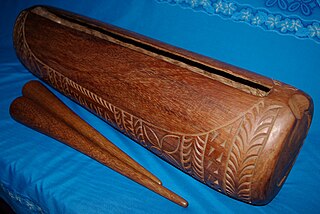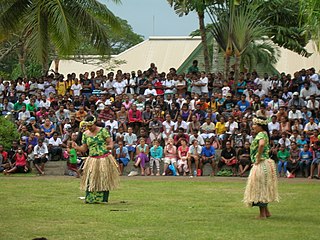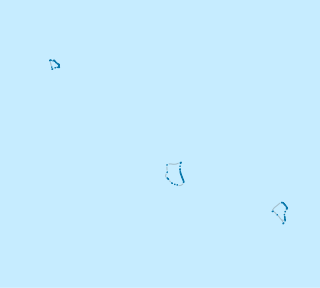Tokelau may refer to:
Tokelau may refer to:

Tokelau is a dependent territory of New Zealand in the southern Pacific Ocean. It consists of three tropical coral atolls: Atafu, Nukunonu, and Fakaofo. They have a combined land area of 10 km2 (4 sq mi). The capital rotates yearly among the three atolls. In addition to these three, Swains Island, which forms part of the same archipelago, is the subject of an ongoing territorial dispute; it is currently administered by the United States as part of American Samoa. Tokelau lies north of the Samoan Islands, east of Tuvalu, south of the Phoenix Islands, southwest of the more distant Line Islands, and northwest of the Cook Islands.

The music of Tokelau occurs in the atolls of Atafu, Nukunonu, and Fakaofo. It is dominated by communal choral activity in harmony, with percussive accompaniment including log drums (pate), pokihi and apa. Nukunonu is notable for traditional song and dance.
Tokelauan is a Polynesian language spoken in Tokelau and historically by the small population of Swains Island in American Samoa. It is closely related to Tuvaluan and is related to Samoan and other Polynesian languages. Tokelauan has a co-official status with English in Tokelau. There are approximately 4,260 speakers of Tokelauan, of whom 2,100 live in New Zealand, 1,400 in Tokelau, and 17 in Swains Island. "Tokelau" means "north-northeast".

Nukunonu, formerly known as Duke of Clarence Island, is the largest atoll within Tokelau, a dependency of New Zealand in the south Pacific Ocean. It comprises 30 islets surrounding a central lagoon, with about 5.5 km2 (2.1 sq mi) of land area and a lagoon surface area of 109 km2 (42 sq mi). Motuhaga is the only islet that has inhabitants. It has an estimated population of 448.

The politics of Tokelau takes place within a framework of a parliamentary representative democratic dependency. The head of state of Tokelau is King Charles III in right of his Realm of New Zealand, who is represented by an Administrator. The monarch is hereditary, the Administrator is appointed by the New Zealand Minister of Foreign Affairs and Trade.

The office of head of government of Tokelau, often simply called the Ulu, rotates yearly between the faipule (leaders) of Tokelau's three atolls: Atafu, Fakaofo, and Nukunonu. The current Ulu is Kelihiano Kalolo, the Faipule of Atafu atoll, who has held the position since 6 March 2023.

Kuresa Nasau is a Tokelauan politician who has served as head of government five times and as faipule of Atafu.

A referendum on self-determination was held in Tokelau on 20 October and on 22–24 October 2007, with the result being that self-governance was rejected. Had it been successful, the referendum would have changed Tokelau's status from an unincorporated New Zealand territory to a self-governing state in free association with New Zealand, akin to the Cook Islands and Niue. However, the referendum required a two-thirds positive vote to pass, and the "yes" side fell short of the required total by 16 votes.

The following outline is provided as an overview of and topical guide to Tokelau:

The Council for the Ongoing Government of Tokelau is the executive body in Tokelau. It serves as the governing organization for Tokelau when the General Fono is not in session. The council has six members, consisting of the faipule (leader) and pulenuku of each of the three atolls, Fakaofo, Nukunonu, and Atafu. It was established in November 2003, replacing the Council of Faipule, which had been established in 1993 and had three members – the three faipule.

Salesio Lui is a Tokelauan politician. He was the head of government of Tokelau from February 1993 to February 1994 and again from 1 March 2013 to 24 February 2014.

Tokelau has two official languages: Tokelauan and English. Over 90% of the population speaks Tokelauan, and just under 60% speak English. Also, 45.8% of the population speak Samoan, and small percentages of the population speak Tuvaluan and Kiribati.
The following is an alphabetical list of articles related to Tokelau.
Aliki Kelihiano Kalolo is a Tokelauan politician who currently serves as Head of the Government of Tokelau, or Ulu since 13 March 2013. He previously served in the same position from February 2012 to March 2013, again from 12 March 2019 to 9 March 2020, and again from 8 March 2021 to 19 May 2022. He is a member of the Council for the Ongoing Government of Tokelau, serving as Minister for Foreign Affairs, Education, Economic Development, Natural Resources and the Environment, prior to and then simultaneously to his leadership of the government. The office of Ulu rotates on an annual basis between the faipule of each of the country's three atolls; Kalolo, as faipule of Atafu, took office as Ulu for the first time in 2012.

The vast majority of people in Tokelau are Christians and Christianity plays a significant role in the Tokelauan way of life.

Siopili Perez is a Tokelauan politician. He served as the Head of Government of Tokelau from 23 February 2015 to 8 March 2016, from 6 March 2017 to 5 March 2018 and from 19 May 2022 until 6 March 2023.

Susana Tetane Lemisio is a community organiser and educator from Tokelau.

Tokelauan people are a Polynesian ethnic group native to Tokelau, a Polynesian archipelago in the Pacific Ocean, who share the Tokelauan Polynesian culture, history and language.

The COVID-19 pandemic in Tokelau is part of the ongoing worldwide pandemic of coronavirus disease 2019 caused by severe acute respiratory syndrome coronavirus 2. Tokelau reported its first confirmed case on 21 December 2022. COVID-19 reached all three of Tokelau's main atolls in July 2023, when the government confirmed the community spread of the virus on Fakaofo, the last atoll without infections.
A fatupaepae is a matriarchal senior figure in the culture of Tokelau. Fatupaepae groups are village-level women's organizations in Tokelau, with one such group in each atoll of the island territory: Atafu, Nukunonu, and Fakafo.